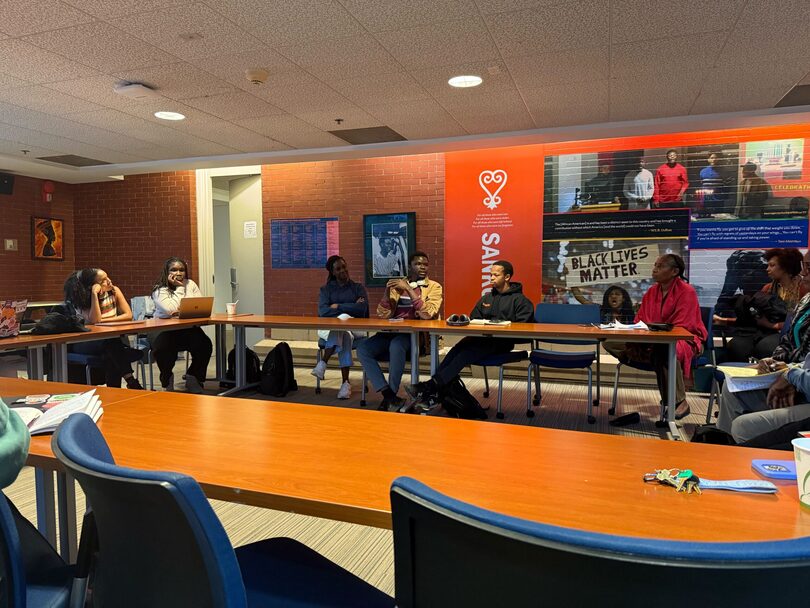Africa Initiative, SU’s Young Democratic Socialists denounce Project 2025

SU students and faculty from the African Initiative and the Young Democratic Socialists of America denounced Project 2025 in a Wednesday evening meeting. Student members called it a threat to minorities, freedom of speech and African foreign policy. Isabel Meléndez-Rivera I Staff Writer
Get the latest Syracuse news delivered right to your inbox.
Subscribe to our newsletter here.
Syracuse University students and faculty from the Africa Initiative and the Young Democratic Socialists of America at SU denounced Project 2025 in a Wednesday evening meeting, calling it a threat to minorities, freedom of speech and African foreign policy.
Student members of the Africa Initiative led the discussion and reviewed a document detailing Project 2025. The 900-page document, published in 2023, was created by the Heritage Foundation, a conservative policy research institute, according to the United States Department of State.
Around 25 people attended, discussing the proposed changes to U.S. federal government operations and policies.
“I still feel like the average person doesn’t know what’s going on in this document,” said Ananda Collins, a political science Ph.D. student and speaker at the event.
Project 2025 threatens freedom of speech and democracy, Collins said. She cited President Donald Trump’s efforts to defund public media and the threats by Federal Communications Commission Chair Brendan Carr to revoke ABC affiliate licenses after TV host Jimmy Kimmel’s remarks regarding Charlie Kirk’s death.
Mateo Lopez-Castro, a senior sociology and television, radio and film major, said these public services are in danger of being replaced with conservative programming such as PragerU.
“They’re pushing this propaganda so that people born within the digital age, who are now born within and socialized through that information, are pushed and are embedded with that ideology,” Lopez-Castro said.
Jeninya Holley, a first-year master’s student studying Pan African studies, played several videos showing arrests made by U.S. Immigration and Customs Enforcement in schools, churches and hospitals. She pointed to Project 2025’s immigration policies, which state that ICE should be able to arrest anywhere in the U.S. “without a warrant.”
“It’s not just people who are undocumented, but if you look like you fit the description, then this heavily militarized agency is authorized to attack you, which is insane,” Holley said.
Attendees agreed that immigration is an issue that affects everyone, especially marginalized communities.
Tobi Brown, a master’s student studying Pan African studies, said the conservative movement targets academia and, specifically, what is being taught in classrooms. Brown cited the possible creation of trade programs at Harvard University as an example of intervention in higher education.
“It’s important for them to target knowledge production, because you have these generative sections of the education system,” Brown said. “Calling into question the very ideas that they want to implement.”
In October, the Trump administration presented universities with the Compact for Academic Excellence in Higher Education, a list of commitments to be signed in exchange for priority access to federal grants. At a University Senate meeting Wednesday night, SU Chancellor Kent Syverud said the university will not sign the compact in its current form.
Attendees also discussed the project’s proposal to cut back on foreign aid to impoverished countries, saying, even before the possibility of reductions, assistance was already “meager.”
Political Science Professor Horace Campbell said Africa is particularly impacted by U.S. aid, and this type of intervention creates food insecurity and dependency issues.
“The U.S. is not in the business of giving aid to anyone,” Campbell, who is also a professor of African American studies, said.
Some attendees discussed their experiences growing up in Africa and receiving U.S. foreign aid.
Marcellin Adjoumane, a fourth-year Ph.D. student at SUNY ESF, said he disliked traditional African food growing up, and enjoyed the food provided in U.S.-sponsored canteens.
“A lot of us have been kind of brainwashed to some extent,” Adjoumane said. ”Now that these programs have been cut, I feel like it’s a good thing because if these kinds of things stop and there is no more funding for these propaganda media, or there is no funding for bringing us food, that will kind of modify our behavior.”
Campbell called Project 2025 an “ideological document,” describing many of its policies as an “attack” on the lower class. However, students expressed confusion about how to counter these proposals.
“This presentation is actually very, very important for the Africa Initiative and for our place in being a producer of information,” Campbell said.
Mahder Serekberhan, a graduate student studying political science, said the Africa Initiative is a critical intellectual space where students can discuss the reality of what’s going on in the world and how it directly applies in their lives.
As part of the resources provided to students, members of the initiative displayed a QR code linking to a Project 2025 Tracker. The website, started by two Reddit users, shows that 48% of Project 2025 policy proposals have been implemented.
Attendees ended the session by discussing how to mobilize locally to resist some of the changes proposed by Project 2025. Lopez-Castro said that supporting communities in Syracuse is key.
It’s important to break the university’s “ideological monopoly,” Lopez-Castro said. Explaining that it often exists within a bubble where community members don’t believe their actions affect anything else.
“If we don’t make this internal change, then the effects and the decisions that the university makes, that affect the people of Syracuse, there won’t be much movement with that,” Lopez-Castro said.





